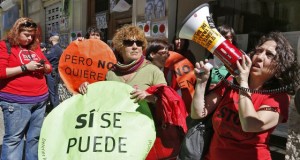
But Fascism is also a political and economic system. Why, then, cannot we have a clear and generally accepted definition of it? Alas! we shall not get one – not yet, anyway … All one can do for the moment is to use the word with a certain amount of circumspection and not, as is usually done, degrade it to the level of a swearword. (George Orwell ‘What is Fascism?’)
Godwin’s Law, a kind of internet update of Orwell’s own theory, states: “As an online discussion grows longer, the probability of a comparison involving Nazis or Hitler approaches.”
I was reminded of this recently as the increasingly hysterical debate over anti-eviction protests, or escraches, has raged. In particular, the deputy leader of the governing Partido Popular (PP), María Dolores de Cospedal, brought it to mind, when she described the protesters as “Nazis” and “fascists”.
“Going round to someone’s house, pointing them out, saying ‘I know where you live’ and carrying out physical or verbal violence against them and the people inside that house is an act of totalitarianism, of Nazism, or fascism,” she said.
The escraches are a new form of protest led by the PAH anti-eviction campaigners, who say it is a last resort. The name is taken from similar actions in Argentina, where activists gathered outside the homes of individuals suspected of collusion with the murderous dictatorship and chanted, in a bid to shame them.
Their intention in Spain is to pressure politicians – always conservative, usually of the PP – to change the law regulating mortgages and evictions. According to some of the targets, at times, demonstrators have gone beyond the norms of lawful protest, banging on their doors and shouting abuse. The PAH insists its methods are peaceful.
But Cospedal isn’t the only PP politician to cast the escraches in a sinister historical light. The party’s leader in the Madrid region, Esperanza Aguirre, also compared them to “National Socialism” and “the bullying of ETA”.
Neither Cospedal nor Aguirre can speak from any personal experience, or indeed with any great authority, of the horrors of Nazi Germany, or what Jewish people suffered during Kristallnacht and in concentration camps.
Last autumn, Cospedal said that protesters who surrounded Congress were akin to the leaders of the 1981 coup d’état which sought to restore a totalitarian regime in Spain. The irony of that comment was not lost on those who witnessed the police’s brutal handling of a mostly peaceful demonstration.
Both cases reflect a tendency by Cospedal and her colleagues to play fast and loose with history, to conjure up the most dramatic scenario they can think of in order to frighten and chasten voters. But it’s an irresponsible, self-defeating way to communicate. The effect with the escraches has been to raise the temperature of a serious debate and deepen the divide in Spanish society between those making the laws and those subject to them.
The comparison with ETA, it could be argued, is slightly different. When it comes from the Madrid-based Aguirre, it lacks substance. But the PP’s Basque leader, Antonio Basagoiti, has lived much of his political career with bodyguards, to protect him from ETA. When he says the escraches remind him of the bad old days and that pro-ETA activists have infiltrated the demonstrations, his political slant may be questioned, but not his personal experience.
Unfortunately, elsewhere, the words “Nazi” and “fascist” will continue to be bandied around by politicians who, like embittered internet commentators, have little grasp of the weight that words can carry.
You would think that a party that has done so much to preserve the memory of one of Hitler’s allies would not be so ignorant about fascism.
Franco was a Spanish conservative. ‘Nuff said!